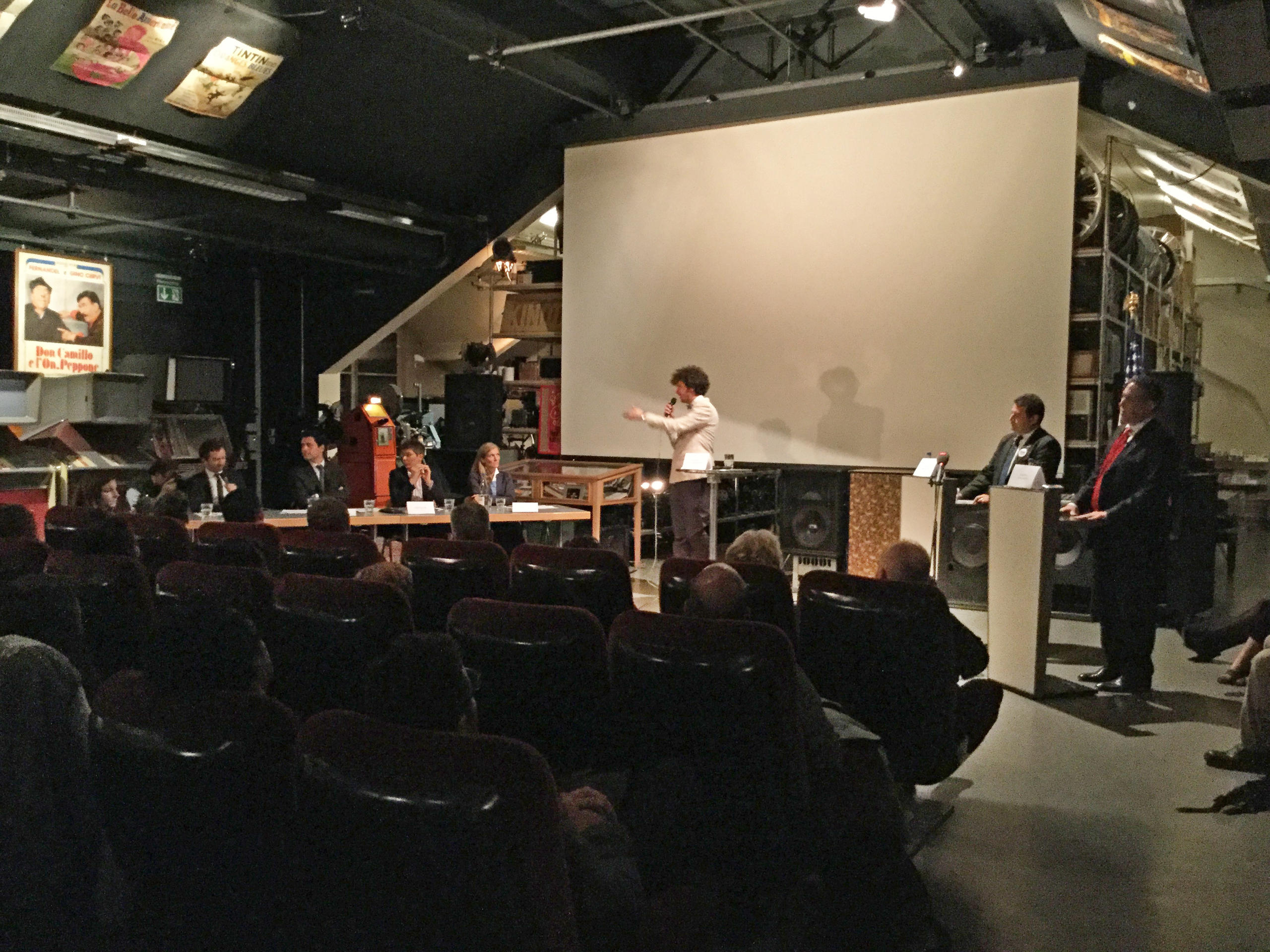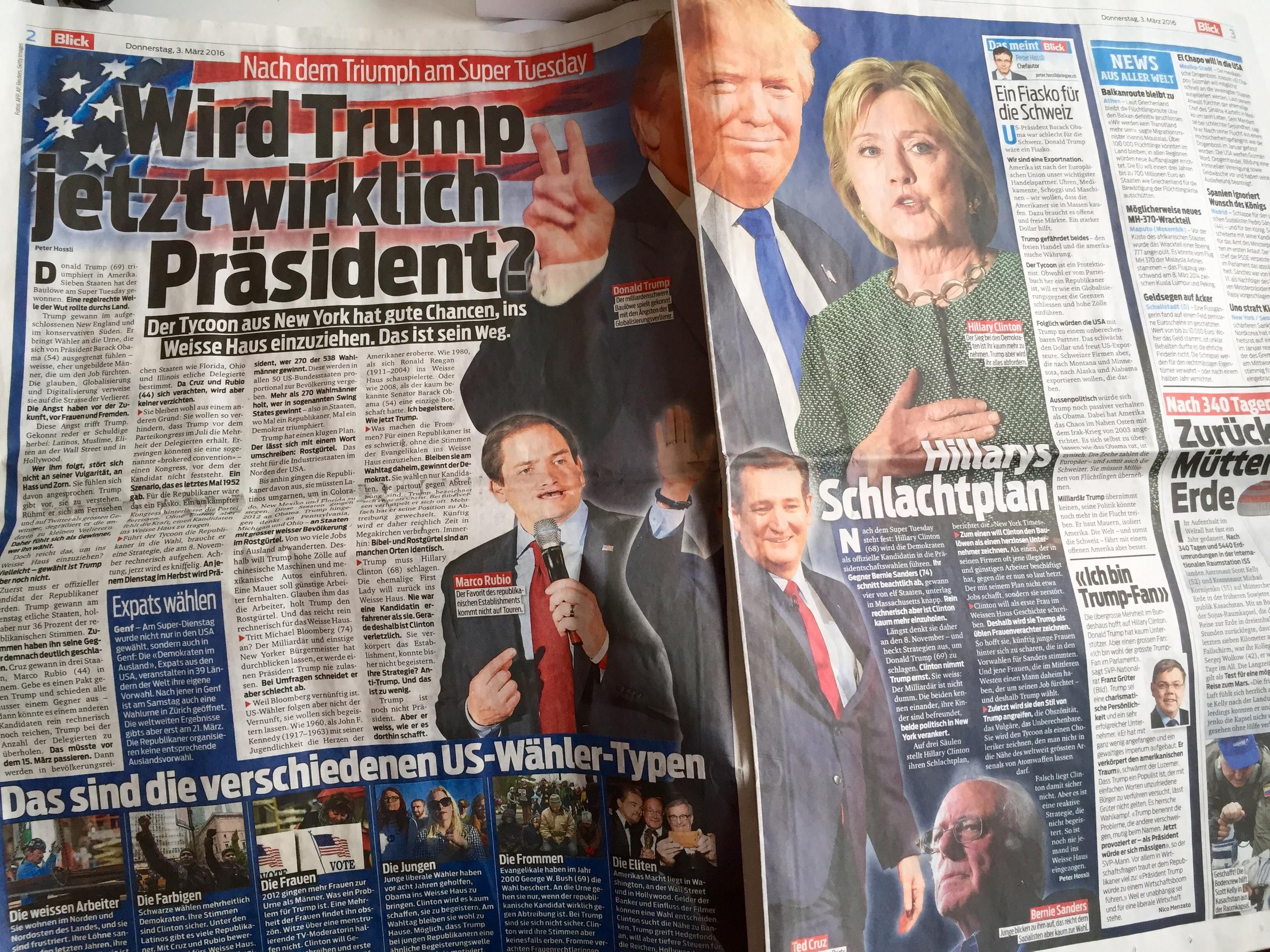‘Does Donald Trump understand what democracy means?’

Democratic politician Hillary Rodham Clinton and Republican billionaire Donald Trump – or at least their stand-ins – took to the stage in Bern to exchange views on hot-button American election issues ranging from gun control to war policy and the meaning of democracy.
Five days before the first US presidential debate, James Foley of the Republicans Abroad organisation and Gregg Robins of the Democrats Abroad “played” Clinton and Trump in a mock debate sponsored by the American Embassy in Switzerland.
Journalists from the Swiss Broadcasting Corporation (swissinfo.ch’s parent company) as well as the Neue Zürcher Zeitung and Tages-Anzeiger newspapers posed questions to Foley and Robins for 90 minutes before an audience of about 150 American expatriates and interested members of the community in the Swiss capital.
When it came to the question of how to overcome the bitter partisan divide in American politics that has caused a near-standstill in much legislative action within the US capital, there was a lot of acknowledgement of the problem by both sides – but few solutions offered.
Robins, for the Clinton camp, argued that his candidate – who served as a first lady, US senator and the nation’s top diplomat – “has a lot of experience working in the Senate and across the aisle, has been endorsed by Republican figures, and has a lot of respect from people she’s worked with”.
He also blamed so-called gerrymandering – a widely used tactic among the parties of organising local political districts along partisan, racial and ethnic lines – as a key factor behind the deep-seated divide in the country.
Foley, arguing the real-estate mogul Trump’s position, alluded to a well-known cultural and ethnic barrier in Switzerland when he acknowleged that “the Röstigraben has become even deeper in the United States”. Rösti is a potato dish popular in the German-speaking areas and the graben, or “trench”, it describes often is used describe different ways of thinking between German- and French-language Swiss regions.
But both debaters said the make-up of Congress will be the biggest determining factor in whether the future president will be able to get anything done.
News of mass shootings and gun violence account for many of the Swiss headlines about the United States. One of the Swiss journalists on the panel asked how the candidates plan to address the fact that “more US citizens are killed by guns than terror attacks”.
In response, Robins called the National Rifle Association “a despicable organisation” and said his candidate’s platform will be to “introduce sensible gun control, background checks and limits on assault weapons”, and to “make it clear that the culture around guns needs to change.”
Speaking for Trump, Foley argued that “there are already sensible gun laws on the books and requirements for registration” in place and that no more are needed.
“The vast majority of gun violence happens in poor areas with guns that are not purchased or registered legally,” he said. “How will that be solved by taking away people’s right to bear arms?”
Foley also argued that Switzerland is a model in this regard. He said that “everyone in Switzerland owns a gun”. The audience grew restless at that suggestion, and when the moderator asked how many did actually own a gun, about five people out of 150 raised their hands.
However, the crowd was hardly representative of Switzerland, which has become one of the best-armed nations in the world with more guns per capita than almost any other country except the United States, Finland and Yemen. In 2011, Swiss voters rejected a proposal to tighten the nation’s relaxed firearms laws – a decision hailed as a victory by gun enthusiasts, sports shooters and supporters of Switzerland’s citizen soldier tradition.
The issue of the United States’ conflicts with other countries was also on the minds of the Swiss journalists, who fired questions about what the candidates proposed to do about more than five years of failed efforts to quell the fighting in Syria as well as how “hawkish” Clinton would be if elected to office.
Both debaters agreed that removing Syrian leader Bashar al-Assad from power is unlikely to happen “for political reasons”. Robins pointed out that “mistakes were made in Syria a few years ago by creating a power vacuum”, acknowledging that “Clinton was more aggressive on the Syria front at that time, which may or may not have helped” the situation.
His opponent seized on that point, asserting that Clinton’s push for involvement in Syria “has not helped” and that Trump would “look at the situation and say, ISIS needs to be defeated or it needs to be defunded. And we need to take US involvement out of the region”.
The journalists working in Switzerland’s direct democracy also wanted to know: does Donald Trump understand what democracy means, based on offensive comments he has made publicly?
“Of course he does,” argued Foley, saying that his candidate simply has a more “off-the-cuff” way of addressing issues and that “we have done ourselves a disservice in the West by paying far too much attention to what offends least as opposed to what affects the most positive change”.
Robins didn’t buy that argument.
“It’s fairly clear from Donald Trump’s actions, words, and attacks on others that he neither believes in the democratic system nor fully understands how it works,” he said. “Civil liberties would be hugely at risk if he won.”
Headlines about Trump’s desire to build a wall with Mexico also reached Switzerland, and the questioners wanted to know how the real estate mogul plans to make Mexico pay for the structure, as he has suggested.
Foley said there were many options, including an export tax on items bound for Mexico or fees on bank transfers to the country. He said the wall is needed to keep out immigrants who put too much pressure on the US economy by competing for jobs and praised European governments who have introduced similar barriers – physical or metaphorical – against immigrants.
But Robins argued the US-Mexican barrier is only a metaphor and that “no one actually believes there is going to be a wall”. He pointed out that the net flow of immigrants is now larger from the United States to Mexico than the other way around.
Other topics discussed at the debate included measures to support the American middle class as well as tax reform and the potential influence of Bill Clinton and the Trump family business on the candidates’ potential presidencies.
An excerpt from the debate was also broadcast live on swissinfo.ch’s Facebook page:
Playing Clinton and Trump
Why did Gregg Robins of the Democrats Abroad in Switzerland and James Foley of the Republicans Abroad agree to take on the roles of US presidential candidates Hillary Rodham Clinton and Donald Trump?
“I did it because I think especially this year it’s really important to educate people about what’s going on,” Robins said. “I think the level of discourse in America has reached such a low level that it’s important that people understand the issues, especially abroad.”
“I’ve had so many people ask me about Trump, to the point where when people ask me where I’m from I say Switzerland because I don’t want to get into a discussion.”
Foley admits he didn’t vote for Trump – he already cast his ballot for Gary Johnson, the Libertarian candidate. For him, the biggest challenge of debate preparation was answering the question “what would Trump do?”
“Nobody knows what a candidate will do. What they say on the campaign trail is completely different than what they would do if elected,” he said.
For US Ambassador to Switzerland Suzi LeVine, the evening was all about encouraging American citizens abroad to vote and highlighting the first amendment of the US Constitution.
“In my mind there’s no greater demonstration of freedom of speech than our election process, and if we can have this little microcosm of it here in Switzerland, that allows us to really show it off,” she said.
Contact the author of this article on Twitter. External link
What questions would you put to Clinton and Trump if you could? Let us know in the comments.

In compliance with the JTI standards
More: SWI swissinfo.ch certified by the Journalism Trust Initiative











You can find an overview of ongoing debates with our journalists here . Please join us!
If you want to start a conversation about a topic raised in this article or want to report factual errors, email us at english@swissinfo.ch.